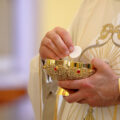Truth vs kindness: Christian approaches to gender
Truth vs kindness: Christian approaches to gender
Christians are responding to changing gender norms. Is gender a biological truth of creation, or should one respect different gender identities?
This weekly comment was written by Zonne Dijkstra and reflects her personal analyses and opinions, rather than those of EARS.
Changing gender norms
Today, gender is a much debated topic. More and more people are coming out as transgender, nonbinary, genderqueer, or genderfluid.[1] Along with this social change, several European governments are in the process of reviewing new laws on gender registration. The Dutch cabinet, for example, intends to adopt a revised version of the Transgender Act. This would allow people to change their gender before the law without a statement from a doctor or psychologist.[2]
In Scotland, the parliament recently passed a new bill that gives people more freedom to choose and change their gender.[3] With the new bill, the legal requirement of a medical diagnosis of gender dysphoria has been removed. The two-year waiting period for obtaining official recognition has also been abolished. Apart from this, the age for gender reassignment has been lowered from 18 to 16 years.[4]
Gender as a biblical truth
These new developments surrounding the issue of gender have inspired heated discussions in Christian spheres. The Bishops’ Conference of Scotland, for instance, responded to the new gender bill with great concern and disapproval.[5] However, there are several ways of approaching the topic of gender from a Christian perspective.
The notorious Nashville Statement, published in 2017, reflects a rather conservative approach. It describes a binary model of gender that, according to this worldview, cannot be disputed. Take the following two phrases:
- “We affirm that differences betweenmale and female reproductive structures are integral to God’s design for self-conception as male or female.”[6]
- “We affirm that self-conception as male or female should be defined by God’s holy purposes in creation and redemption as revealed in Scripture.”[7]
The first sentence refers to a biological ground of gender; the second refers to scripture. The Bible tells us that human beings are created either male or female by God. Reproductive systems provide the biological basis for this binary model. This view on gender therefore appeals to a biblical and biological truth.
What if there is more to gender
This conservative Christian worldview offers a reasonable and organised account of gender. Its binary thinking gives structure to reality and makes gender understandable to us. However, it can be argued that this view is too narrow. One could say that it simplifies the complex reality of gender. What if gender is more than a biological fact of creation? Our binary gender categories of male and female may seem straightforward, but the reality that underlies them is likely more complex.
- To begin with, traditional gender categories do not consider those who are biologically different. Intersex people have biological traits that do not neatly fit into either gender category. Their sex characteristics do not correspond to the biological sexes of male and female.
- Moreover, gender categories are shaped by social and cultural meanings. They are not solely defined by biological traits. They also refer to the social norms associated with being male or female. Femininity is typically associated with nurture and care, while masculinity is more often associated with strength and assertiveness. Girls are expected to be accommodating, while boys are expected to be dominant. These expectations may be connected to biological features, but they are also the product of social and cultural mechanisms.
- Apart from this, gender is a part of a person’s identity and experience. People typically experience themselves as having a particular gender identity. But there are people whose experience of themselves does not fit in with the gender category that is assigned to them. Transgender people experience their gender identity as being different from the sex category they were given at birth. Non-binary people do not identify with either of the traditional gender categories. And there are various other experiences of gender that do not conform to a binary model.
A sensitive response to gender nonconformity
A conservative Christian view on gender insists on putting people into two boxes: male and female. But some people simply do not fit into these boxes. By insisting on a binary model of gender, this view excludes the experience of these people. Perhaps gender is indeed more complex than the binary model assumes. If this is true, one could say it is unfair to exclude those who do not fit in with this model. A binary model is perhaps too simplistic to capture the reality of gender.
In any case, genderqueer people can experience serious harm on account of being excluded. Queer people are silenced, stereotyped, and stigmatised because they do not fit into the dominant categories of gender. As a result, those who visibly diverge from the existing gender norms are regular targets of violence. They are often insulted, ridiculed, or attacked, and do not feel safe in public spaces.[8]
But there is an approach to gender that avoids these harmful consequences. This approach requires respect for diverging experiences of gender, even if we do not understand them. Nowadays, many Christians choose to take this approach, taking into account Christian values of compassion, kindness, and love. Instead of appealing to truth, they focus on a sensitive way of treating people who do not fit in with a binary model. Rather than excluding those who fall outside the scope of normality, they respond to the heterogeneity of experiences with respect.[9]
Truth or kindness?
Hence, Christians can take different approaches to the issue of gender. There are Christians who insist on a binary model, presenting it as a biblical and biological truth. Others, however, take a more sensitive approach that focuses on moral values of kindness and compassion.
If gender is indeed a deeply complex notion, an appeal to truth is likely to fall short. Perhaps we cannot grasp the full truth of gender because there is simply too much at play. But as long as we hold on to a binary model, those who do not fit in are excluded and harmed on account of their difference. For this reason, I think that we should favour an approach that respects different experiences and treats people with kindness.
This weekly comment was written by Zonne Dijkstra and reflects her personal analyses and opinions, rather than those of EARS.
Our team of analysts conducts daily research on religion and society. In the past month, the topics of tension and leadership were trending. Find out their relationships on the EARS Dashboard.
Sources
[1] 1% of adults identify as neither male nor female
[2] Transgenderwet vraagt om gebed
[3] Scotland passes transgender self-indentification bill
[4] ‘Genderwet’ kan jongeren schaden, zeggen Schotse Bisshoppen
[5] ‘Genderwet’ kan jongeren schaden, zeggen Schotse Bisshoppen
[6] Nashville Statement – CBMW
[7] Nashville Statement – CBMW
[8] Veiligheid – Transgender Netwerk Nederland
[9] Zo wordt er in de kerk over transgenders gedacht: van variant op homoseksualiteit tot verrassing van God






